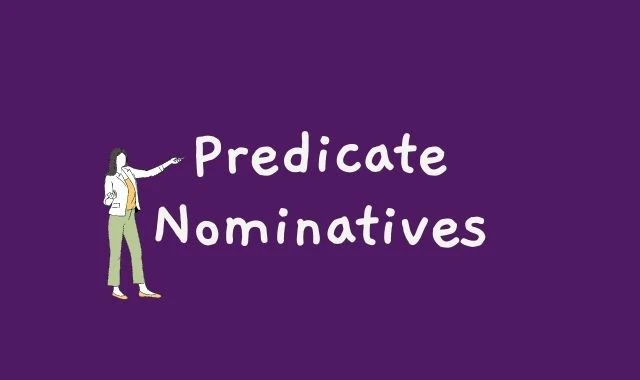Introduction
When it comes to English grammar, understanding predicate nominatives is an essential skill. These nouns and pronouns can serve as the subject complement in a sentence, adding important meaning to the overall message. In this blog post, we will dive into the ins and outs of predicate nominatives, exploring their usage, structure, and examples. Whether you're a student or just looking to brush up on your grammar skills, this post will provide a comprehensive guide to mastering predicate nominatives.
Predicate Nominatives
What is a subject complement?
A subject complement is a complement that identifies or modifies the subject of a linking verb.
REMINDER
Some common linking verbs include forms of be (such as am, is, was, were, being, will be, and have been), appear, become, feel, grow, look, remain, seem, smell, sound, stay, taste, and turn.
What is a predicate nominative?
A predicate nominative is a type of subject complement that identifies or refers to the subject of a linking verb.
EXAMPLES
- The Grangers were the first settlers in the region. [The noun settlers identifies the subject Grangers.]
- Who is the woman in the back row? [The pronoun Who refers to the subject woman.]
- The goal of the architects is to restore the building to its original condition. [The infinitive phrase to restore the building to its original condition functions as a noun and identifies the subject goal.]
NOTE
EXAMPLE
- What an interesting sculpture that is! [The noun sculpture identifies the subject that.]
Compound Predicate Nominatives
A predicate nominative may be compound.
EXAMPLES
- The colors of the rainbow are violet, indigo, blue, green, yellow, orange, and red. [Violet, indigo, blue, green, yellow, orange, and red identify the subject colors.]
- The top salespeople for the month were Brady and Ramona. [Brady and Ramona refer to the subject salespeople.]
<->
Predicate Nominatives Quiz
$$
For each of the following sentences, choose the predicate adjective.
Predicate Adjective vs. Predicate Nominative Kahoot Quiz
Frequently Asked Questions: Predicate Nominatives
Q1: What is a predicate nominative?
A predicate nominative is a noun or pronoun that follows a linking verb and renames or identifies the subject of a sentence.
Q2: How does a predicate nominative differ from a subject?
The subject is what the sentence is about, while the predicate nominative renames or restates the subject.
Q3: What are some common linking verbs used with predicate nominatives?
Common linking verbs include "is," "am," "are," "was," "were," "become," and "seem."
Q4: Can you provide examples of sentences with predicate nominatives?
Certainly, here's one: "She is a doctor." In this sentence, "doctor" is the predicate nominative renaming "she."
Q5: Are predicate nominatives only used in English grammar?
No, they are found in various languages, but their specific rules may vary.
Q6: Why are predicate nominatives important in writing and grammar?
They clarify relationships between subjects and their identities or qualities, making sentences more informative.
Q7: Can a single sentence have multiple predicate nominatives?
Yes, a sentence can have more than one if there are multiple linking verbs or related renamings.
Q8: How can students identify and use predicate nominatives effectively?
Students can practice recognizing linking verbs and understanding how they connect subjects to predicate nominatives in sentences.
Q9: Are there online resources for learning about predicate nominatives?
Yes, educational websites and grammar guides offer explanations and exercises to help learners understand and use predicate nominatives
Q10: Can you explain the difference between predicate nominatives and predicate adjectives?
Predicate nominatives rename the subject, while predicate adjectives describe it. For example, "She is a teacher" (predicate nominative) vs. "She is happy" (predicate adjective).
References
- Huddleston, Rodney, and Geoffrey K. Pullum. The Cambridge Grammar of the English Language. Cambridge University Press, 2002.



